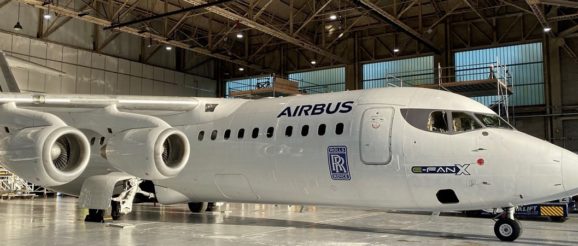View from Brussels: Virus pressure risks killing transport innovation | E&T Magazine

The outbreak’s economic impact is still hard to fathom, although current estimates predict that it will knock several percentage points off the GDP of most European countries. That means that fledgling ideas in all sectors are at real risk of cancellation.
In aerospace and shipping, that risk has already become a reality as two of the continent’s largest companies – aircraft builder Airbus and fertiliser giant Yara – have pulled the plug on projects that promised to be game changers.
Last month, Airbus revealed that plans to fly a hybrid electric jet next year will be suspended, in order for the company to “navigate the realities” caused by the pandemic. The E-Fan X demonstrator plane had been in the works for a number of years.
Engine-builder Rolls Royce, which was also involved in the project, said that pushing on with the E-Fan X’s maiden flight “is not critical at this time”, adding that the firm still hopes to perform ground tests with the power unit.
Aircraft emissions are a sore point for the aviation industry, which has not yet bet on a solution to curb its output. Although the Airbus plan has a long-term perspective and there were doubts about its applicability to wide-body aircraft, the technology did promise to make a huge impact on regional flights.
Both firms involved with the E-Fan X are now concentrating their efforts on mitigating the outbreak’s damage to their respective businesses, which have been hard hit by a huge slump in air travel demand and the knock-on effect on order books.
The Airbus project’s demise is unsurprising given the current circumstances and the fact that a maiden flight was still some time away. But a recently suspended shipping project does raise real concerns about the virus’ effect on innovation in the sector.
Norwegian fertiliser giant Yara was until last week on course to launch what it touted as the world’s first fully autonomous cargo ship, which would have run on zero-emission power as well.
The Yara Birkeland’s 120-tonne hull was successfully put in the water at a shipyard in Romania in February and was due to be fitted out with its systems at a Norwegian port this month.
But in a statement, the firm said that “due to Covid-19 and the changed global outlook, Yara has decided to pause further development of the vessel and will assess next steps together with its partners”.
The move is surprising as Yara’s main business of producing fertiliser has been spared the worst effects of the pandemic and the company is reportedly still in the black.
Its vessel was commissioned in 2017 and was intended to operate along the Norwegian coast, shipping containerised fertiliser from production site to depot. The objective was to cut 40,000 truck journeys per year and curb emissions thanks to onboard battery power.
The project could also have been a litmus test for autonomous navigation, which is still in its infancy, as well as the fully-automated container terminal that Yara planned to go with the vessel.
Instead of substantially new ways of transporting goods and people, European countries look set to double down on established systems and ideas.
As part of an upcoming trillion-euro recovery plan, the European Union is reportedly aiming to ramp up the amount of cash it funnels into electric-car-charging infrastructure and boost incentive schemes.
According to a draft of the working documents that will accompany the recovery plan, seen by E&T, Brussels also wants to make zero-emission vehicles exempt from VAT across the bloc.
It is likely to be a pattern that will be repeated sector by sector as the virus recovery takes off: sustainable but low-risk targets for investment will trump high-risk projects, even if their potential payoffs are huge.
Autonomous green ships and electric airliners will have to wait a while longer it seems.
